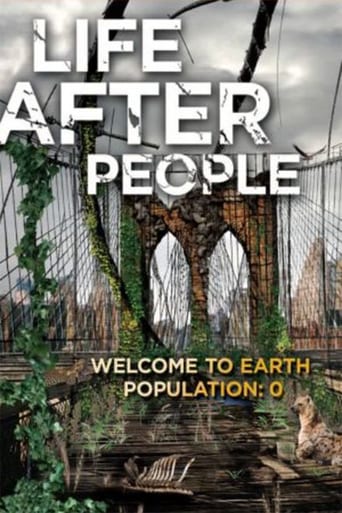Kat Webb
This series is a little too tightly focused on the USA. It shows what would happen to almost every major city in the USA in a life after people but only a handful of places around the world. I feel it is highly dramatised and only describes what could happen if the worst possible set of circumstances were to occur. Everything that is built in the modern era is portrayed to be very brittle and fragile and most of modern society's achievements will apparently not last more than 100-200 years. A building that has already lasted 100 years might not last another 20 years without humans and the only reason given is "lack of maintenance". At times it does get a bit repetitive,just showing building after building giving up, falling down, then the cycle repeats. The jumps in time which are commonplace may cause a little confusion.
Cedric Sagne
Life after people is a ripoff of Alan Weisman "World without us" (first of all by using a title structure in three words, but whatever).The basic thought experiment of Alan Weisman is aimed not so much at looking at how nature would recover after we have left, and how buildings etc deteriorate but in fact analysing to what extent our actions on the environment are permanent.Life after people (the main program) hardly mentions our use of plastics, our pollution of the planet with PCBs, how permanent nuclear waste will be and focuses on the mild, innocent traces of us that will be erased easily: wood, paper, iron, cement. Overall both the program and the series remain a list of crumbling buildings, repeated over and over again, with the same engineering viewpoint.The series (which I lazily address with this comment too) do mention this a bit more, along with our impact on fauna (eg bison population), or the recovery of fish population due to our current overfishing. Too little still.The documentary is reasonably good, padded with special effects that are shown over and over again, and with a shift of focus to American landmarks, which is understandable as it was made for US TV.The content presents a somewhat idealistic and benign-ized vision of our impact on the planet, which really misses the point of actually addressing what are the harmful things we are doing right now and which our descendants will curse us for.
PyTom83
I watched it when it first aired and It was really interesting and fairly awesome. I think the entire thing kind of reinforces my not being religious. I mean 10,000 years after we all die all of our buildings fall down, all of our paper rots away, and the entire place is all grass again. Plus, from the documentary, if you took the entire history of planet Earth and made it into a 24 hour day humans would only make up 30 seconds of that day. Our entire human existence is 30 seconds out of a full 24 hour day yet the world is here for us and made for us? Please.We're just not that special or important. Probably the creatures with the highest intelligence that will ever walk the face of the planet but that's about it. The world wasn't designed for us, we're just here.
EchoMaRinE
Good work but relies so much on the fact that people disappear as they evaporate. Anything that can kill us till the last man shall have some effect on the environment that we live I assume. Even a deadly epidemic can not kill everyone instantly. From my point of view, they should have dwell on the possible causes of our extinction and create scenarios depending on these. If it is climate changes for example, buildings will fall before they rot because of hurricanes or what so ever.Another point is, once a species like human disappears totally from a habitat, a lot of other species must disappear as well. As we are the main predators on the planet, without our existence, it is quite difficult to say what can survive and what can not. They tell the story in a way that nothing but people disappears. They focus so much on trees and plants. If we disappear, the bug population will explode since there will be a lot of corpse to eat. After they are done with us, they can destroy the forests. What I want to say is, we already changed the ecosystem some much. Without us, before a fair balance, another species (may be bugs) that may not be as sane as us (I mean it, we do not destroy totally) may destroy more species in a quite short time period than we did over the history of man.

